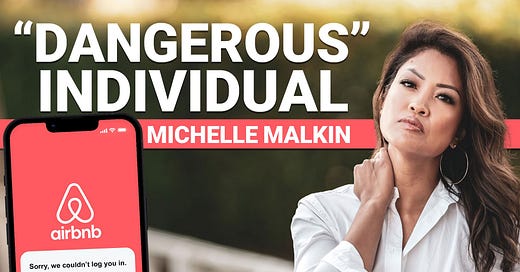Has former Fox News pundit Michelle Malkin taken the red pill? Last year she moved her blog (the biggest political blog in America?) and its massive archives to the Unz Review, home of notorious dissidents and “conspiracy theorists” like yours truly. Since then Malkin has come under increasing fire by the usual suspects, culminating in last week’s banning from AirBNB.
Banned from lodging for harboring politically-incorrect views? What’s next, “disagree with us and you won’t be allowed to purchase food”? (Maybe I shouldn’t give them any ideas…)
Twenty years ago, when I was a witch and Malkin a witch-hunter, I never thought we’d be playing on the same team. But now we’re both witches, and the witch-hunting team is coming after us with torches blazing. I salute Michelle Malkin’s courageous decision to step outside the mainstream (she had more to lose than I did) and appreciate her willingness to engage in fearless and uncensored conversation—and to apologize for her mistakes in the wake of 9/11, including joining other Fox News personalities in attacking me for seeking the truth about 9/11.
Below is a lightly-edited transcript of the interview.
Kevin Barrett Interviews Michelle Malkin, 2/11/22
Kevin Barrett: This is Truth Jihad Radio, questioning official stories since 2006. Please subscribe by way of the Substack button at TruthJihad.com.
Welcome back to this live radio show broadcasting every Saturday evening from 7 to 9 p.m. Central where I am and whatever time it is, wherever you are, it's always time to talk to the most interesting folks who have something outside the box to say.
My second, hour guest is brand new to Truth Jihad Radio. She recently moved to the Unz Review, which is one of my homes on the internet. I'm talking about Michelle Malkin. You may have seen her on Fox News or elsewhere. And she is now in the news for having been banned from Airbnb for her political views.
Wait a minute, they can ban you from lodging? You try to check into the motel and you find out that you said something political that somebody didn't like and you can't stay there anymore? Are we all going to be homeless? Are they going to ban us from eating? Things are really getting strange in America today. Let's try and make some sense of it. Hey, welcome Michelle Malkin, how are you?
Michelle Malkin: Good. Thanks for having me.
Kevin Barrett: So what's with Airbnb? I can't believe it. Since when did people start getting banned from accessing these kinds of basic services in America due to their political stances?
Michelle Malkin: Well, it's been happening for a while, but with particular regard to the dissident right. A lot of young activists and journalists and independent citizens, researchers that identify themselves as truly America First, as opposed to the appropriated generic brand that we're now seeing from the Republican Party. It's been happening for quite a while, and I'm certainly not the first canary in the cancel culture coal mine on this. In fact, in 2019, when I came out with my latest book called Open Borders Inc., I dedicated it to many of the patriots who have already been suffering de-housing, de-platforming, de-banking and now, most recently, a twist of de-planing. There are a number of individuals, and I'm trying to get a complete list of them through a Freedom of Information Act request, who've been either put on the no fly list or designated by the TSA as heightened security risks, and either stopped and swabbed for bomb-making materials, prevented from booking tickets online, this type of thing. The designation is SSSS. And I identified at least two individuals who had been classified as such. So the idea that I could be retaliated against by a service provider of public accommodations like Airbnb is certainly in keeping with that trend. The new twist or new wrinkle, at least to my mind, is the fact that not only was I punished specifically for speaking at the annual American Renaissance conference last November, but my husband's account was also deleted. And he is not a public figure. He's not a journalist. He wasn't at the conference. But it doesn't matter. And the idea that it was my speech was also pretextual, because Airbnb didn't bother to obtain a transcript or a video of the speech before they made this decision.
Kevin Barrett: So this wasn't really about anything you said. It was about associating with the wrong people. It's guilt by association. And I guess they're saying that American Renaissance is, quote unquote, a hate group. So whatever you say at their convention, it's equally bad. Which strikes me as very strange. If I were invited by any group to talk to their convention, I'd probably go. And if I disagreed with them, I would explain why. And then I guess I would get banned by Airbnb just for having been to their convention if it's a convention that Airbnb doesn't like. I really don't understand that logic.













